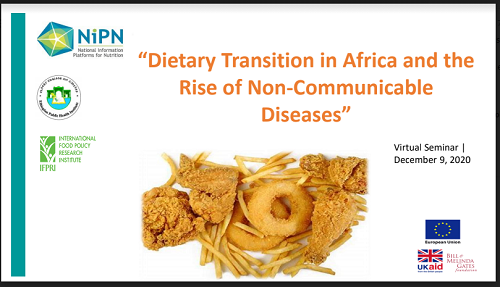NIPN Webinar hosted on December 9, 2020

The fifth NIPN virtual webinar entitled "Dietary Transition in Africa and the Rise of Non-Communicable Diseases (NCDs)", co-organized by EPHI and the International Food Policy Research Institute (IFPRI) was held on December 9, 2020.
Dr. Olusola F. Sotunde, a trained nutritionist, a registered dietitian, and the Senior Technical Advisor for Nutrition and Health at Beth Davis International, delivered the keynote presentation. She explained the nutrition transition and that the shift in dietary consumption and energy expenditure, coincide with economic, demographic, and epidemiological changes. She noted key drivers of dietary transition, including population growth, urbanization, globalization of food distribution system, food processing and the fast-food industry, global income growth, and an ageing population.
She presented dietary patterns and shared evidence of the trends in per capita packaged food sales in Africa, in energy purchased from sugar-sweetened beverages and age-standardized intake of dietary factors among adults aged 25 years or older at the global and regional level. She focused on factors in urban African food environments that influence dietary behaviors and the role of dietary transition on the rise in NCDs in Africa.
Among the recommendations, she mentioned, the need to implement global food and health policies to, for instance, promote the domestic production and global consumption of healthier food, the significance of nutrition education (including social behavior change communication) to promote healthy diets (more fruits and vegetables and less ultra-processed foods) and applying practical public health interventions aimed at healthier lifestyles.
Two panelists shared their reflections on the keynote presentation. Dr. Meron Girma, Senior Public Health Analyst, EPHI/NIPN noted a change in dietary habits, an increase in obesity and overweight rates in urban Ethiopia and contributing factors such as economic growth and improvement in living standards.
A research by IFPRI showed that calorie intake is increasing, carbohydrate is a major contributor to daily diets, and consumption of processed foods are higher in urban than in rural areas. On the other hand, consumption of sugar-sweetened beverage daily intake in Ethiopia is low. She explained that there is no standard dietary tool to measure the changing diet and that such a tool is highly recommended.
Dr. Mussie G/Michael, Public Health expert, NCD Team, Disease Prevention and Control Directorate of the Ministry of Health (MOH), explained the health-related complications linked to NCDs; in 2016, 52% of all deaths in Ethiopia were due to NCDs with cardiovascular disease as the leading cause of death. He presented risk factors for NCDs including high salt intake and low vegetable and fruit consumption. Dr. Mussie stressed the importance of public awareness and promoting healthy diets, the significant role of nutritionists to promote nutrition education, underlined the importance of developing dietary guidelines and liaising with the Ministry of Education to promote healthy diets in schools.
The virtual webinar was attended by 40 participants from government, non-government, research and academic institutions. To access the presentations, please click HERE.



